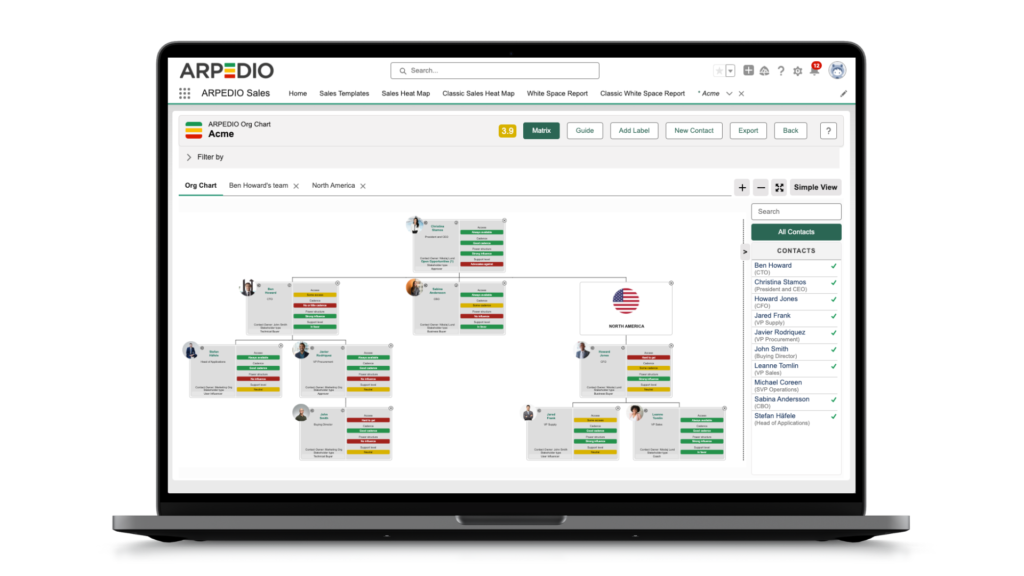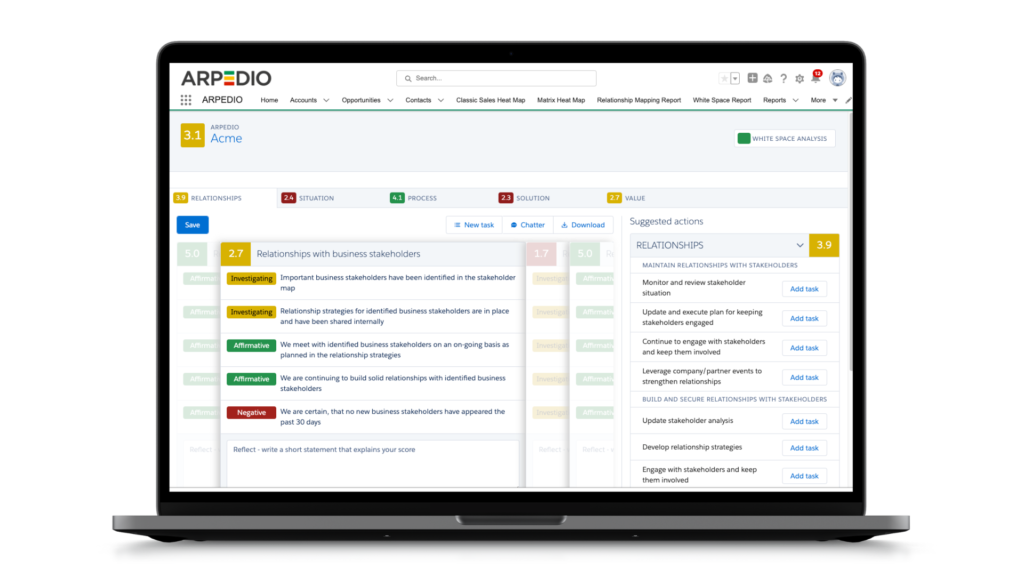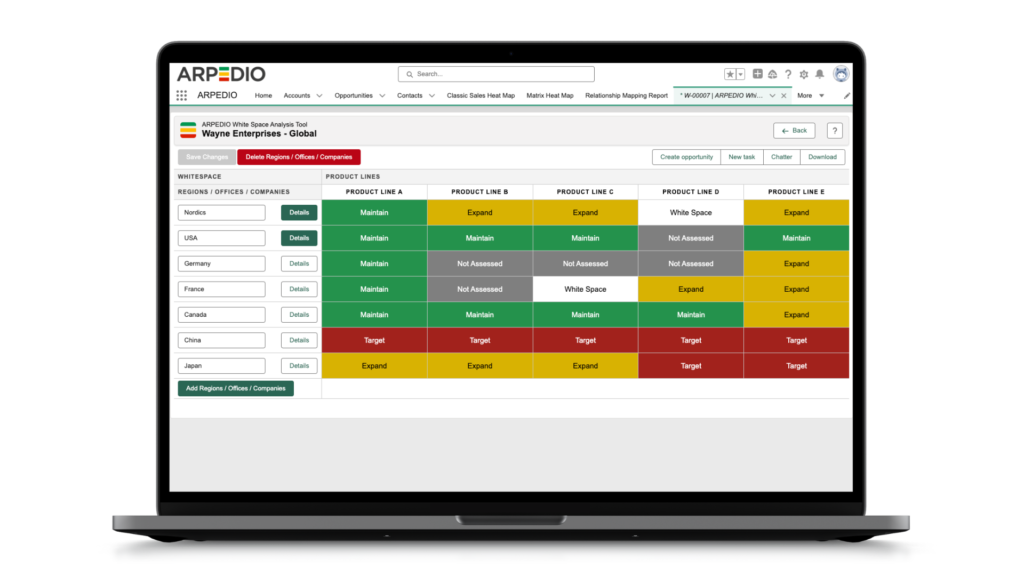When it comes to B2B sales, companies often find themselves wrestling with a myriad of challenges, from a lack of prospecting skills to navigating lengthy sales cycles. These challenges underscore the pivotal role of Account-Based Selling (ABS) strategies in aligning offerings with buyer needs. Grounded in a profound understanding of customers, ABS emerges as a beacon of innovation set to revolutionize the sales landscape.
This article uncovers the transformative power of ABS, particularly when augmented by Artificial Intelligence (AI). Through thorough and expertly grounded exploration, we unravel how ABS not only tackles obstacles but also accelerates processes, promising to carve a path that shapes the future of B2B sales.
A deep understanding of the customer
Research indicates that both high and low-performing companies in the B2B sales landscape commonly face challenges, including a lack of prospecting skills, non-adherence to sales processes, and difficulties in sourcing quality sales representatives. These challenges hinder the ability to align offerings with buyer needs, underscoring the significance of ABS strategies.
ABS, built on the fundamental principle of comprehending customers deeply, tackles these challenges head-on. It entails understanding customers’ identities, communication preferences, priorities, buying criteria, decision-making processes, and more. In this regard, AI emerges as a transformative tool. AI not only helps us gain a profound understanding of our customers at record speed, surpassing previous levels, but also aids in prioritizing time and team resources for enhanced effectiveness and efficiency. Without a comprehensive understanding of our customers, determining the core selling activities becomes challenging, leading sales reps to focus on less beneficial activities.
Overcoming long sales cycles
The commitment to drive account-based growth and focus on strategic account management frequently leads to extended sales cycles. This poses a challenge to the aspiration of consistently delivering customer intimacy. Managing sales cycles that can span 5-10-20 months requires sales professionals to sustain their roles as trusted advisors, consistently delivering value even when taking over from others. However, the transition between sales professionals often presents difficulties, particularly without proper transparency. Transparency is facilitated through data, underscoring the critical importance of CRM and ABS technologies when employing an account-based approach.
The role of AI in Account-Based Selling
Traditional CRM systems are often perceived as relational, while ABS technology emerges as a powerful tool that is increasingly critical to firms’ ability to win, serve, and retain customers (The Forrester Tech-TideTM: B2B Sales Technologies, Q1 2023). ABS technologies improve visibility into the potential of each account, coordinate sales efforts, and reveal complex relationships with key stakeholders, all while reducing the manual effort required to track and manage opportunities throughout the sales process. This transformation occurs with the data already stored in the CRM, making the CRM more transactional than relational.
A good example of this is how ARPEDIO, a recognized ABS vendor, has built its services to be 100% Salesforce native. This means that the platform is developed specifically for Salesforce and seamlessly integrates with the systems and data stored within it. This is a huge benefit for companies actively using Salesforce but seeking to enhance their focus on account-based strategies.
With the CRM and ABS Platform in place, imagine the acceleration AI can bring to this setup, offering the capabilities this technology provides. Contrary to a common misconception, AI is not necessarily about reducing labor costs; instead, it focuses on elevating efficiency, productivity, and overall success. AI capabilities can provide sales organizations with in-depth knowledge about buyers, encompassing their background, current situation, trends, industry insights, and more. AI proves invaluable in rapidly sorting through this vast amount of information, a task that would traditionally consume a considerable amount of time.
It’s crucial to emphasize that AI will never replace the essential role of a salesperson. Particularly in the context of ABS, where interpersonal connections are paramount, it’s essential to recognize that people ultimately buy from people. However, ABS technology, combined with CRM and AI, can streamline collaboration, assist with account planning, and support various technical aspects, enabling sales professionals to concentrate on leveraging the newfound intelligence.
Forrester’s research underscores that buyers are willing to engage with sellers if they can deliver valuable and meaningful interactions. As a seller, thorough preparation and becoming a qualified conversation partner are imperative.
Utilizing AI in this manner, equipping sales professionals with comprehensive knowledge about their customers becomes the cornerstone for building a powerful plan for Account-Based Growth.
It all comes back to the data
Two scenarios that may resonate with many sales professionals are:
- Feeling, or having felt in the past, that the CRM is relational, and that you are inputting data primarily for someone else’s benefit rather than for your own.
- Completing numerous Excel sheets and crafting countless org charts in PowerPoint slides, only to find them outdated or unable to be located on the drive.
How can these issues be resolved? Just like with anything else, having something to motivate and drive you can push you to take the right actions. This holds true for both monkeys and humans alike.
You can phrase it as the give/get balance between the CRM system and the account manager/account team needs to be equivalent — or perhaps even tipping positively towards the “get” side. Fortunately, with AI and ABS technology, we observe that systems are now starting to favor the seller. Peter B. Lange, AI Specialist at Salesforce, highlights the give/get balance: “Account-Based Selling is crucial, it is the future way of selling in business-to-business, and as we talked about you need to enable yourself as a qualified conversation partner, you have to be that trusted advisor, you have to focus on the client and not on your selling. And all these tools can help you to do that as we are tipping that “give/get” balance that is so crucial.”
AI excels at analyzing massive amounts of data and providing insights that sellers can use immediately — automating internal processes like note-taking, forecasting, opportunity scoring, and lead qualification. This grants sellers the time for what many of them desire: spending more time with customers and engaging in actual selling.
However, there is a ‘but.’ Establishing trust in AI-based systems and ensuring data quality present significant challenges. You need to crawl before you can walk — and hopefully, eventually run. If your data quality is poor, so will the output of your AI usage be. Good AI requires good data. You need to build a data foundation and harmonize your data. But this should be seen as an advantage for sellers: Building a robust AI machine should also encourage sellers to input data as it would benefit them in the long run. AI in the context of CRM is a demanding but also very rewarding technology.
In general, how does AI impact ABS? It impacts relationship mapping, account insights, coaching, and more. AI is removing friction and automating many tasks that we used to depend on sales reps to manually create and enter. Now, ABS tools are making it a living and breathing process, establishing it as a discipline within the organization. The entire premise of ABS is a deep understanding of your customers and then using this understanding not just to build the plan but to execute on the plan and continually adapt that plan to reality. In this regard, ABS tools have made significant strides, transforming this into an ongoing practice throughout the year as we engage with customers and uncover new opportunities, with ABS technology guiding us through this process.
Conclusion
As we navigate B2B sales in 2024, the integration of AI and ABS emerges as a transformative force. By fostering a deep understanding of customers, overcoming extended sales cycles, and leveraging data effectively, sales professionals can thrive in a landscape where technology complements human expertise. The journey toward embracing AI is not without its challenges, particularly regarding data quality, but the rewards are significant. The future of B2B sales lies in the harmonious synergy between AI technologies and the ingenuity of sales professionals, creating a dynamic and adaptive approach to ABS.
This article is a summary of the discussion held on January 31, 2024, during a LinkedIn Live Session featuring Steve Silver (VP, Principal Analyst at Forrester), Peter B. Lange (AI Specialist at Salesforce), and Ulrik Monberg (CEO & Founder of ARPEDIO).










